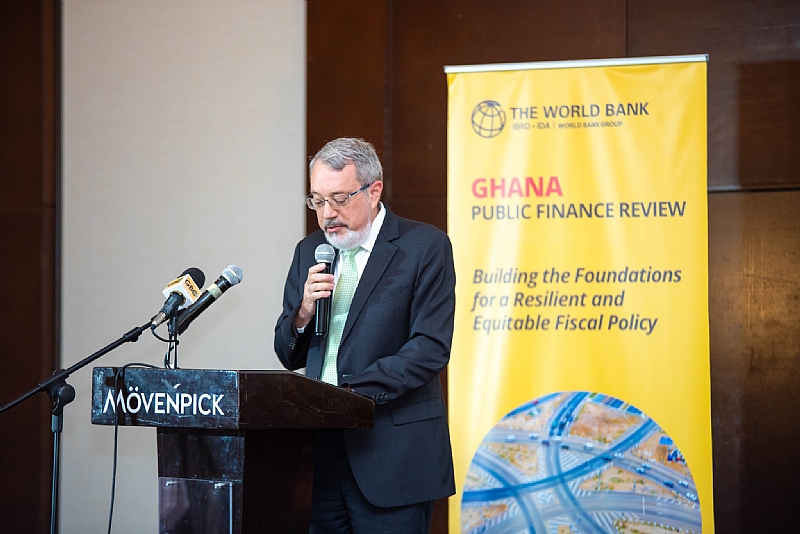Ghana’s economic recovery hinges on fiscal consolidation and debt restructuring, but these measures must be implemented with careful consideration for their impact on the most vulnerable segments of society. Robert Taliercio, the World Bank Country Director for Ghana, Liberia, and Sierra Leone, emphasizes the need for fiscal adjustments that are both fair and efficient. This entails safeguarding investments that benefit the poor and stimulate economic growth while concurrently bolstering domestic revenue collection. Equally crucial is addressing the mounting fiscal burdens originating from the energy and cocoa sectors, two key pillars of the Ghanaian economy. These recommendations underscore the delicate balancing act required to stabilize the economy without exacerbating existing inequalities.
A new World Bank report, “Building the Foundations for a Resilient and Equitable Fiscal Policy,” provides a granular analysis of Ghana’s public finances, examining the efficiency, equity, and impact of government revenue and expenditure. The report delves into critical issues such as domestic revenue mobilization, public expenditure efficiency, public financial management, the public sector wage bill, and the effectiveness of spending on human development and agriculture. These areas represent critical components of Ghana’s fiscal landscape, and the report’s findings offer valuable insights into the strengths and weaknesses of the current system. This comprehensive assessment serves as a crucial roadmap for policymakers seeking to enact meaningful reforms.
The report highlights a confluence of factors that contributed to Ghana’s 2022 economic crisis. David Elmaleh, a Senior Economist at the World Bank, points to a lack of fiscal discipline and an expensive fiscal response to global shocks as primary drivers. This fiscal indiscipline manifested in weak budgetary institutions, high fiscal liabilities, and insufficient revenue collection. The prolonged and costly response to the COVID-19 pandemic, coupled with the subsequent deterioration of global economic conditions, further exacerbated the situation, ultimately pushing Ghana into debt distress. This highlights the vulnerability of developing economies to external shocks and the importance of prudent fiscal management.
The report identifies several specific issues contributing to Ghana’s fiscal challenges. High tax exemptions, for example, result in significant revenue losses, equivalent to 3.9 percent of GDP. Government expenditure is characterized by overspending, particularly during election years, and a high proportion of non-discretionary spending, limiting the government’s flexibility to respond to changing economic circumstances. Furthermore, public spending on education is deemed inefficient, with insufficient focus on preprimary and primary education, the foundation of a strong educational system. The National Health Insurance Scheme (NHIS) is also facing financing shortfalls, undermining progress in healthcare, as the NHIS no longer receives its full allocated levy due to capping laws. These findings underscore the need for targeted reforms to optimize resource allocation and ensure that public funds are used effectively.
To address these challenges and build a more resilient and equitable fiscal policy, the report recommends a series of medium-term policy actions. These include strengthening fiscal discipline and oversight by implementing fiscal rules, enforcing effective spending controls, and improving the oversight of contingent liabilities. Enhancing domestic revenue mobilization is crucial, and the report suggests broadening the tax base and strengthening tax administration to achieve this goal. Strategic investment spending is also emphasized, focusing on areas that support economic transformation and climate resilience, such as infrastructure development and technological innovation. These recommendations aim to create a more sustainable and robust fiscal framework capable of withstanding future shocks.
The findings of the World Bank report provide valuable guidance for the Ghanaian government as it develops long-term policies to foster a more resilient economy. Dr. Alex Amankwah-Poku, a public financial management practitioner, speaking on behalf of the Minister of Finance, acknowledged the report’s significance and affirmed the government’s commitment to utilizing its findings in policy formulation. The implementation of these recommendations will be crucial for Ghana’s economic recovery and its long-term sustainable development. By addressing the underlying issues of fiscal indiscipline, inefficient spending, and inadequate revenue mobilization, Ghana can lay the foundation for a more robust and equitable economic future.


